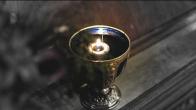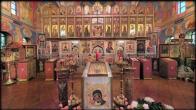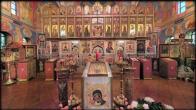Our Parish
You are here
2005. Pilgrimage to Holy Sites is not just coming into contact with holy things...
I first encountered the geographic term “Jordanville” when, so to speak, the Soviet Union was still “alive.” It is true that by then in many countries Gorbachev’s terms “perestroika” and “glasnost” needed no translation. I received a copy of a Prayer Book published by the Holy Trinity Monastery Press from someone who had gone on the first pilgrimage to Palestine (to the Holy Fire at Holy Sepulchre) then sponsored by the Russian Orthodox Church on the occasion of the Festival of Slavic Literacy, the Day of Sts. Kirill and Methodius, who had given the world the Cyrillic alphabet.
Truly, the Lord’s paths are inscrutable... At the time, I could not have even imagined that a little over ten years later, I would find myself at the place where one of the first Orthodox books in my library had been published. I remember, during those years, I paid special attention to the place of publication – Jordanville. At first glance, it was a geographical place name. However, since Fr. Victor Potapov explained the name’s origin, I now understand that even for a Christian who speaks only Russian, it is not a foreign term.
On the recent pilgrimage sponsored by the Washington parish of St. John the Baptist, everything was new to me; apparently, for that reason, it made a great impression on me. The schedule of events can be summarized as follows: the pilgrimage began with a Panikhida at murdered brother Joseph’s grave, and ended there as well on the following day, after the Sunday Liturgy. However, it was preceded by careful preparation by the organizers [of the pilgrimage]. I think that everyone who took part was keenly aware of that. Fr. Victor and Matushka Maria had resolved all organizational matters, including taking care to arrange transportation for those without means of getting to church on their own, so that all might get to the church at 5:00 AM and successfully return home after midnight. On my telephone answering machine, there are still several messages from Matushka Maria regarding various people she had contacted to give me a ride to church early in the morning. By the way, I would like to take this opportunity to thank Georgi Kereselidze, Constantine Terletsky and Natasha Feschenko for their help.
In our two days of travels, we were able to once again appreciate Lyuba Zhurbenko’s masterful culinary expertise, as well as the constant sensitive close attention and concern shown by Anna Vikhlyaev, who took part in the pilgrimage.
You must agree that all these things are not simply unimportant details. The spirit of mutual assistance, care, and attention toward one another, is something that will remain unforgettable memories of those with whom I was discovering Jordanville, or as it is here so justifiably known – “Russian America.” A thought comes to mind: was it not for such an Orthodox spiritual legacy that brother Joseph took such torments upon himself? While on the road, we watched a touching film, made by Fr. Victor and Matushka Maria Potapov, documenting their visits to the places where brother Joseph spent his last moments. I would like to add that the film program presented on our way was well planned and well supplemented our travels to Jordanville.
In his opening talk, Monk Vsevolod, who welcomed us and who acted as our guide in Jordanville, said that the pilgrimages of the parish of St. John the Baptist in Washington had become a monastery tradition, and that people in the monastery looked forward to these encounters.
Archpriest Vladimir Manitchev, our compatriot from Russia, who is rector of the Holy Protection and Holy Dormition Cathedrals in Novosibirsk, and who was staying with Inna and Yura Petcherkine, came with us to Jordanville.
In bidding farewell to our parishioners before returning to Russia, Fr. Vladimir Malitchev said that the impressions of the visit to Jordanville he was taking back with him made this one of his most treasured visits to America.
At the same talk, our guest from Russia said that he had been in Washington for a short time, and had not had the opportunity to see a great deal, but that he was taking a great deal home with him – first of all, a liking for America, for its people and at the same time tremendous respect for the Orthodox faithful of the diaspora, and to put it in secular terms, for his colleagues, the priests of the Russian Church Abroad who, in his words, do not make a lot of money, who do not make careers for themselves in America in the Orthodox Church… Thus, their service to the Church is based, first and foremost on great spirituality and dedication to the ideals of Orthodox Christianity.
Completely unexpectedly, I learned some surprising information in the monastery in Jordanville. It was next to the bookstore, which, by the way, amazed me with its wealth of books - theological, philosophical, historical, and belle-lettres - in Russian. A notice posted on the board told of the benevolent activities of one of the churches in Minsk, my hometown. That comparatively new parish, founded after the collapse of the USSR, is doing great work with orphan children and so-called “difficult youth.” Today, in some Belarus families in which the parents abuse alcohol, children often have to fend for themselves, and as a result sometimes join criminal gangs. The Orthodox Church decided to help such children find their own way to the church. I especially value the work of this particular parish for the fact that they lavish their attention and spiritual warmth on patients at the federal psycho-neurological hospital next to the church. Unfortunately, in the post-Soviet landscape, such ill people continue to be societal outcasts. For this reason, the little bit of information on the bulletin board of a monastery on American soil surprised me and, at the same time, as it were extended a thread linking the Orthodox faithful of Belarus and America.
By the way, perhaps there is nothing unusual in the fact that in Jordanville they should know about the wonderful activities of one of the parishes in Minsk. After all, the spirit of fraternity and mutual assistance is a firm, unshakeable Orthodox treasure that knows no geographic bounds.
I’ve mentioned only some of the people whose acquaintance I made during the recent pilgrimage. I was also happy to become better acquainted with Ivanovna Kukla, with whom I shared a motel room, and who helped me familiarize myself with an unfamiliar place. The publication you are holding in your hands is called “Parish Life.” In fact, that is all the life of people who come to this church for divine services, take part in its charitable activities, the life of those who represent the Washington Cathedral in local pilgrimages, whether in the USA, in Greece, Russia, or Palestine, to which, as Fr. Victor has announced, our parish plans to make one of their next pilgrimages.
By the way, should Philipp and his mother Irina Esterov, and other young boys and girls who took part in the recent pilgrimage to Jordanville go on that pilgrimage, we can confidently state that the trip will not be tiring. More than likely, it, like the trip to Jordanville, will be an optimistic one. Looking into this youth’s joyous eyes, filled with good will (on the bus, Philipp readily offered his help to everyone), you believe that the established spiritual traditions of Washington’s Cathedral of St. John the Baptist are in the reliable hands of the rising generation of Orthodox faithful, heirs to those who today gloriously maintain the Foundations of Orthodoxy.
And of course, I am especially thankful to my compatriot Inna Petcherkine, who on the eve of the trip persuaded me that Jordanville is not just a contact with Orthodox holy things, but also a path to discoveries within myself and the outside world, as well as a closer familiarity and association with people of a single Faith.
Valentina Nevsorova
2005
PARISH LIFE
Address of our Cathedral
Subscribe to our mailing list
While all the materials on this site are copyrighted, you may use them freely as long as you treat them
with respect and provide attribution on the Russian Orthodox Cathedral of St.John the Baptist of Washington DC.









